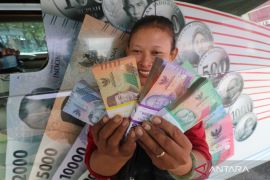"External sentiment, particularly the Feds plan to raise its benchmark interest rate, was the main factor putting massive pressure on the rupiah against the dollar," Bank Mandiri market analyst Renny Eka Putri said here on Friday.
She underlined that many observers believe the Fed will raise its benchmark interest rate in June 2016 once the US economic data shows a downward trend in the unemployment rate and inflation rate, which moves closer to its 2 percent target.
The US Department of Labor, in the week ending on May 14, released preliminary figure for seasonally adjusted initial unemployment claims to reach 278,000, down 16,000 from the revised level in the previous week.
On the other hand, Bank Indonesias decision to revise downward its national economic growth forecast for 2016 from 5.2-5.6 percent to 5-5.4 percent has added to the pressure on the rupiah.
"The two factors related to the Fed and Bank Indonesia played a dominant role in influencing the rupiahs fluctuation. However, the sentiment from the Fed is more dominant because it has a global effect," she explained.
She expressed the hope that Bank Indonesia would intervene in the money market to prevent the rupiah from falling further against the dollar as it can disrupt the national economic growth. (*)
Editor: Heru Purwanto
Copyright © ANTARA 2016











